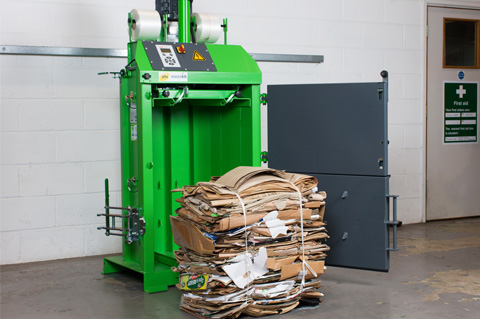
Baling Twine – Useful, Reusable and Recyclable
Many businesses have committed to cardboard and plastic recycling as part of their corporate social responsibility (CSR) obligations. While recycling can reduce waste disposal costs, it also takes up a lot of space in warehouses and storage rooms. Baling is a great space-saving way to keep recyclable waste tidy and more compact, and also allows for easy transport to recycling stations with the help of baler twine (also known as binder twine) to secure the bales.
As the final action in the baling process, baler strapping or baling twine is tied around the bale before it is ejected from the baler machine to keep cardboard and plastic waste from unravelling. Baling twine is often used in preference over baler strapping or wire since it is thinner, more versatile and easier to handle.
What is baling twine made of?
In the past, twine made from sisal fibers has been used to secure bales, however this has been replaced in most instances with twisted polypropylene twine – a type of plastic fibre – which is much stronger and able to cope with weights of up to 280kg, compared to just 80kg of weight-bearing ability of sisal fibers. Despite this, twine made from natural sisal fibers is still well-suited to the binding of hay bales and other farm products, in order to reduce the possibility of twisted polypropylene twine being mixed with animal foodstuffs.
Twine polypropylene is particularly hardy as it has a high melting point, isn’t broken down by water, detergents or acids, and is very durable, easily resisting cracking and stress. These properties make polypropylene ideal for many products other than baler twine, from car bumpers to medical tools.
Other uses for baling twine favour polypropylene twine as it is more resistant to vermin and insect infestation, as well as being very economical. Polypropylene baler twine is also easy to colour, allowing on-site colour coding of bale type or weight. phs Wastekit can supply bailing twine in a range of colour-coded strengths and thicknesses:
White baling twine – 100% polypropylene with a max breaking strength of 125kg, nearly twice as much as twine made from sisal fibers. Available in 1,000m reels.
Orange baling twine – composed of polypropylene and metal with a max breaking strength of 220kg. Available in 500m reels.
Orange and white baling twine – 100% polypropylene with a max breaking strength of 280kg. Available in 350m reels.
How do I access plastic baler twine recycling?
When you hear what is baling twine made of, you may be surprised to learn that polypropylene baler twine (binder twine) is indeed recyclable. As with all recyclable plastics, it must be sent to a specialist recycling centre, collection of which can be arranged through your usual recycling waste handler. It can also be sent to schools or art centres for re-use in creative projects, for a more enjoyable form of plastic baler twine recycling.
As well as baler twine, phs Wastekit provides a full range of baler and compactor accessories to accompany their recycling machines or other balers, such as Orwak, Milltek, HSM, Dixi, CK International, Pakawaste, Kenburn, Bramidan, Workit, LSM, MacFab.
We’re also happy to provide supplies for other uses for baler twine, as well as twine hooks and twine forks, baler wire and ties and bale trolleys. Simply get in touch with phs Wastekit to discuss your requirements or shop online for all of your baler twine and start reducing waste, saving space and keeping costs down.